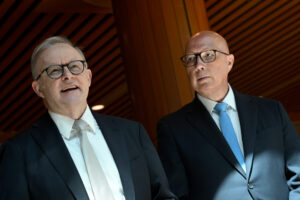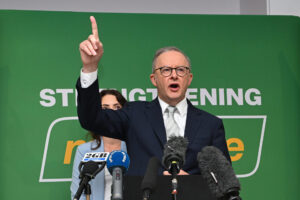9 Takeaways from Revenue Summit 2023
Each year, the Australia Institute’s Revenue Summit brings together leaders from across the community to discuss and explore raising revenue, tax reform and building an economy that funds Australia’s public services into the future.
With the Stage 3 tax cuts set to come into place in July 2024 and windfall profits continuing in several key sectors of the economy, the time has never been more urgent to produce a better and simpler tax system that would result in more revenue, stronger public finances, and a fairer society for all.
Here are nine key insights and big ideas from Revenue Summit 2023.
1/ Labor’s action on multinational tax
We must ensure our revenue system is properly technically designed to prevent its abuse by powerful groups such as multinational corporations. The Labor government’s reforms have included closing tax loopholes, implementing the global minimum tax and improving tax transparency.
Hon Dr Andrew Leigh MP
Assistant Minister for Competition, Charities and Treasury, and Assistant Minister for Employment
Watch: “Multinational Tax Fairness”

2/ Cracking down on big consultants
The ongoing scandal of consulting firms has exposed the ways in which the ‘Big 4’ have exploited the public sector. A roadmap for ‘using revenue for good’ would see the regulation of consultancies and the expansion of the public service. We need to put the public service “back in the driver’s seat of public work”.
Senator Barbara Pocock AM
Greens Spokesperson for Finance, Employment and Public Sector; Senator for South Australia
Watch: “Money for Nothing: Big Consultants and the Future of the Public Sector”

3/ Finding revenue for a civilized society
Australian society increasingly requires and demands better public services. The only realistic way to fund this is through higher revenues, we must improve public recognition that more taxes will be needed to meet demands for public services. An authoritative review and assessment of Australia’s future public spending needs would provide a critical base for linking better services – including in areas such as health, education and aged care services – to tax reforms.
Dr Mike Keating AC
Former Head of the Department of the Prime Minister and Cabinet
Watch: “A Civilized Society Needs More Revenue”

4/ We need fairer financial assistance for businesses
Providing businesses with HECS-style loans instead of grants would achieve the same benefits whilst allowing for other much-needed public spending. If the government had used this system for Jobkeeper during COVID-19 lockdowns we would have saved $89 billion, substantially lowering our debt, and facilitating easier funding of much-needed public spending.
Emeritus Professor Bruce Chapman
Emeritus Professor, College of Business and Economics, Australian National University
Watch: “Lessons from the pandemic: Fairer financial assistance for business”

5/ The link between tax, inequality and the gender pay gap
Despite tax cuts being often justified as encouraging work among the rich, the Stage 3 tax cuts are likely to discourage work among lower income groups and hurt productivity growth. The research also shows that the Stage 3 tax cuts, combined with Australia’s tax, welfare and childcare systems, will have negative effects on overall inequality, the gender pay gap, productivity, and the fertility rate.
Professor Patricia Apps
Professor Apps is a Professor of Public Economics at the University of Sydney.
Speech delivered by Dr Richard Denniss.
Watch: “Stage 3, inequality, and the gender pay gap”

6/ Delivering better, fairer Stage 3 tax cuts
The government can deliver alternatives to the Stage 3 tax cuts that would benefit low- and middle-income earners, while saving the budget money and funding needed public services. There is strong public support – including across voters from all political parties – for repealing or restructuring the Stage 3 cuts.
Greg Jericho
Chief Economist, the Australia Institute
Watch: “Stage 3 Better”

7/ Economic discussions are democratic discussions
Decisions about revenue are also decisions about democracy, and they require input and participation from all of society. Our panel discussed how to decide how much revenue is needed, where it should come from, and how politicians can persuasively argue for tax increases.
Dai Le MP, Senator David Pocock, Dr Monique Ryan MP. Chaired by Paul Karp.
Watch Panel #1 > Crossbench Panel

8/ Revenue is essential for public services
Across the country, a wide variety of sectors require substantially more public spending, accompanied by greater First Nations community consultation and empowerment, revenue is vital to funding this spending and creating a fairer Australia.
Professor Peter Yu AM, Dr Lachlan Clohesy. June Riemer, Maiy Azize, Annie Butler. Chaired by Rachel Withers.
Watch Panel #2 > Revenue for Public Services

9/ Tax is good for the economy
Well-designed taxation enables a just society whilst enhancing an efficient economy. Our panel discussed issues including how much of the economy free-rides on unpaid labour (such as caring and child-rearing) and uncompensated stolen land of First Nations people; our obsession with keeping official budget spending down, and how a robust welfare state helps ensure people’s quality of life.
Professor John Quiggin, Associate Professor Elise Klein OAM, Dr Mark Zirnsak, David Sligar. Chaired by Ebony Bennett.
Watch Panel #3 > Tax Is Good for the Economy

John Quiggin
Between the Lines Newsletter
The biggest stories and the best analysis from the team at the Australia Institute, delivered to your inbox every fortnight.
You might also like
5 ways and 63 billion reasons to improve Australia’s tax system
With a federal election just around the corner, new analysis from The Australia Institute reveals 63 billion reasons why our next Parliament should improve the nation’s tax system.
Business groups want the government to overhaul the tax system? Excellent – we have some ideas.
The landslide win by the ALP has seen business groups come out demanding the government listen to their demands despite having provided them no support, and plenty of opposition, over the past 3 years.
In 2023-24 Australians paid more than 4 times on HECS/HELP than gas companies did on PRRT
In 2023-24 tax from the PRRT was less than an quarter the amount raised by HECS/HELP debts repayments.

